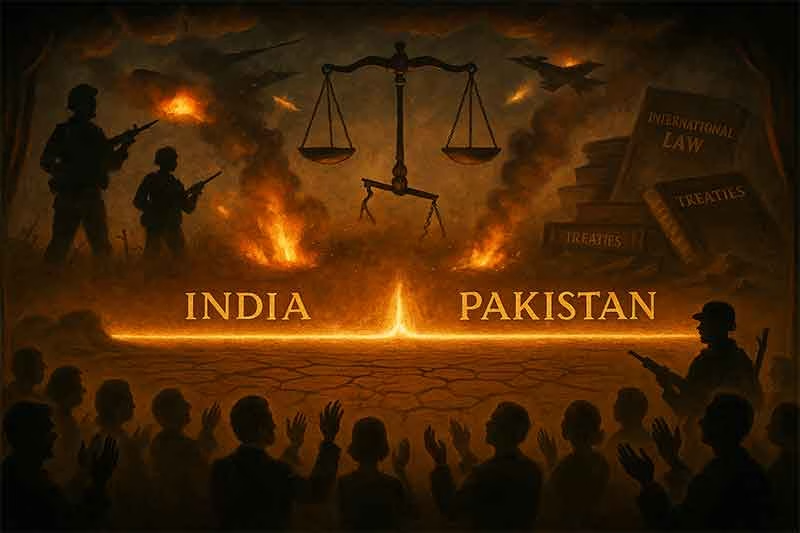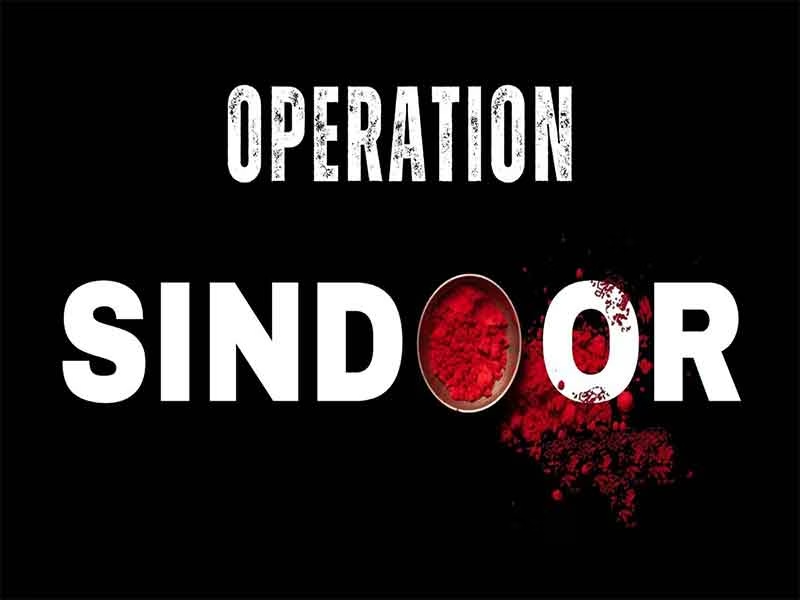
For generations, the notion of an ‘enemy’ has been deeply embedded in the psyche of collective consciousness of Indians. But one must ask: is their enemy the state of Pakistan, or the people of Pakistan? As India and Pakistan remain locked in a protracted cycle of conflict, it becomes evident that what separates them is not merely a physical border, but also the outdated international legal framework that struggles to evolve with modern geopolitical realities.
Patriotism and nationalism are often conflated, but they differ profoundly. If nationalism transforms into a force that teaches citizens to hate people across a border, can it not be seen as the gravest form of institutionalized slavery?
At the heart of this hostility there lies a paradox, borders have become sacred god symbolizing sovereignty while the laws suppose to regulate interstate behavior remain pliable and politically expedient. The condemnations from the guardians of international law are limited to carefully orchestrated press conferences. The UN Resolutions ostensibly drafted to keep the world safe are the only thing that has peace and security in their digital archives unharmed and untouched.
Nationalists fervor transforms their respective citizens into the spectators of militarized operas, applauding for the airstrikes as patriotism. This brutal architecture of realpolitik was planted on their minds by these same sacred borders. War has been never about victory of one, it is all about tragedy of all.
Despite the veneer of international law, both the brotherhood nations have acted outside the bounds of global legal frameworks repeatedly since their respective independence in 1947. The 2019 Balakot Strike carried out by the so called Ahimsa lovers was mowed as preemptive self-defense under Article 51 of UN Charter. Notably this was without the consent of the United Nations Security Council arising complex questions about unilateral military strikes across sovereign borders questions that the United Nations has yet to decisively answer. Ironically, in the aftermath of Operation Sindoor, Pakistan now appears to be borrowing from the same playbook, echoing the language of deterrence without international consensus. The dual invocation of “self-defense” by both states without transparent fact-finding or adjudication should, in principle, weigh heavily on international forums. Yet, it does not.
Hence it is out of room for the questions “Whether there was a Terrorist Camp? Whether they are terrorists? Whether no civilians or militants were killed or harmed?” These are deliberately unanswered yet no one seems to bother. Both respective nations citizens are ecstatic of their own nation’s action and reaction. Both enjoying their own interpretation and perception, enjoying their own sense of justice. Both nation manufactures their own narratives.
India accuses Pakistan of using proxies for border terrorism. Pakistan counters by alleging Indian aggression against civilians. Yet, beyond this military tension lies something far more terrifying: a civilian psychology that romanticizes brutality as patriotic virtue. The legal dispute between nations has mutated into a psychological spectacle. This normalization of violence as nationalism has reduced international law to a passive spectator.
The words on International Court of Justice on the principles of necessity and proportionality in the use of force was neither followed by India nor the Pakistan. The silence from the international institutions is not a legal gap but a moral void.
The child born from the ashes of two world wars such as the equality, peaceful settlement of disputes between the nations remains only a decorative item. The attempt of settlement ostracizes themselves with press releases. The principle of distinction in International Humanitarian Law remains distant from practice. Both nations deny civilian casualties, and both claim righteous self-defense.
The entire India is celebrating this Operation Sindoor as the retaliation and justice towards the terrorist’s attack at Pahalgam. It is being manufactured in the minds of public as national justice and pinnacle of nationalism. The mood is of triumph. But does justice means retribution? At the cost of due process and proportionality?
Both nations are satisfied with the media trials and killing their enemy. No independent International Investigation Council was formed not even proposed. Truth is often a casualty. Both accuse the other of being the perpetrator of war.
A generation raised on hashtags and social media trends in favor of warlike patriotism is more dangerous than terrorist groups. Though both nation founded on ideals of Ahimsa, these two shares the world’s most militarized zone. UN Military Group in Indian and Pakistan was set up in 1949 but it was never mandated or empowered.
The international organizations though it has the mechanisms to mediate remains oddly as an observer. The doctrine of self-defense is being utilized selectively and conveniently but international law never interfered whatsoever. Both countries are not violating each other’s sovereignty but the foundation of human rights and international humanitarian laws.
A nation should not claim victimhood while nurturing terrorism in its backyard. What happened in Pahalgam is against entire humanity, if International Organization was potent to interfere there would have been no bloodshed, though the bloodshed itself is violation of international law. If Pakistan seeks deterrence, it should focus on dismantling the terrorism happening around their back.
Equally alarming rivers are the mediator to connect civilization, but it is unacceptable that India is utilizing an inhuman way of retaliation by condemning millions of Pakistanis into poverty, thirst and displacement by suspending Indus Water Treaty. What possible enmity does this Indian government could have with a children of Pakistan, why innocents has to suffer? Why many million must suffer for two nation’s political rivalry? Instrumentalizing water as a political weapon is an act of war not against Pakistan but against humanity.
Similarly, it is grave injustice to discuss the root of both without setting up an international investigation agency on both these issues. The International Organization should have that spine to do so before jumping into conclusions through these media trials. One with integrity, independence and authority.
Subscribe to Our Newsletter
Get the latest CounterCurrents updates delivered straight to your inbox.
Aswin Rome Pon Saravanan is a practising advocate and author from Tirunelveli District, Tamil Nadu, India














































